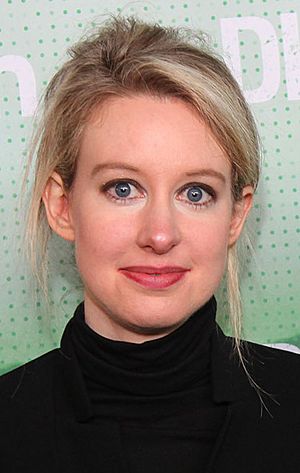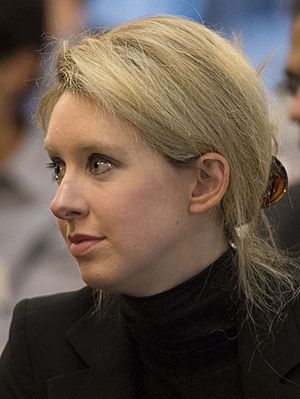Elizabeth Holmes facts for kids
Elizabeth Anne Holmes, born on February 3, 1984, is an American businesswoman known for starting a company called Theranos. She claimed her company had a new way to test blood using only a tiny amount, like a drop from a finger. This idea made Theranos very valuable, and for a time, Elizabeth Holmes was seen as a very successful young entrepreneur.
However, questions soon arose about whether Theranos's technology actually worked as promised. Investigations began, and it was discovered that the company's claims were not true. This led to the downfall of Theranos and legal issues for Holmes.
Quick facts for kids
Elizabeth Holmes
|
|
|---|---|

Holmes in 2014
|
|
| Born |
Elizabeth Anne Holmes
February 3, 1984 Washington, D.C., U.S.
|
| Education | Stanford University (dropped out) |
| Years active | 2003–2018 |
| Known for |
|
| Children | 2 |
| Relatives |
|
Contents
Early Life and Education
Elizabeth Anne Holmes was born in Washington, D.C., on February 3, 1984. Her father, Christian Rasmus Holmes IV, worked in government agencies. Her mother, Noel Anne, worked for a Congressional committee.
Elizabeth's family had a history of success. One of her ancestors, Charles Louis Fleischmann, started a famous yeast company. Her family was proud of this history.
Holmes went to high school at St. John's School in Houston. She was interested in computer programming and even started a small business selling computer programs to universities in China. She also learned Mandarin Chinese.
In 2002, Holmes started studying chemical engineering at Stanford University. She worked as a student researcher there. After her first year, she worked in a lab in Singapore, testing for a virus. In 2003, she applied for her first patent for a device that could deliver medicine through the skin.
In March 2004, Elizabeth Holmes left Stanford. She used the money saved for her tuition to start her own company.
Starting Theranos
The Idea Behind Theranos
In 2003, Holmes founded a company called Real-Time Cures in Palo Alto, California. Her goal was to make healthcare more accessible. She wanted to create a way to do blood tests using only a very small amount of blood, like a few drops from a finger. She said she was motivated by her own fear of needles.
Holmes shared her idea with a medicine professor at Stanford, Phyllis Gardner. Professor Gardner told her that her idea was not possible. Other experts also said the same thing. However, Holmes did not give up. She convinced her advisor and dean at the School of Engineering, Channing Robertson, to support her. Robertson became the first board member for her company.
In 2003, Holmes changed the company's name to Theranos. This name was a mix of "therapy" and "diagnosis." The original name was changed because people were unsure about the word "cure."
Growing the Company
By December 2004, Holmes had raised $6 million to help her company grow. By the end of 2010, Theranos had more than $92 million from investors. In 2011, former Secretary of State George Shultz joined the Theranos board of directors. Over the next three years, Holmes was known for building a very impressive board with many influential people.
For a long time, Theranos operated quietly without much public attention. In September 2013, the company announced a partnership with Walgreens, a pharmacy chain, to open blood sample collection centers in their stores. Holmes started getting a lot of media attention in 2014, appearing on the covers of major magazines like Fortune and Forbes.
Forbes magazine recognized Holmes as the youngest self-made female billionaire in the world in 2014. Theranos was valued at $9 billion, and the company had raised over $400 million from investors. By the end of 2014, Holmes had her name on many patents for her inventions. In 2015, Theranos made agreements with other healthcare groups to use its technology.
Challenges and Decline
Questions Arise
In 2015, a journalist named John Carreyrou from The Wall Street Journal started investigating Theranos. He had received a tip that the company's blood-testing device, called Edison, might not be working correctly. Carreyrou spoke to former employees who shared their concerns and found company documents.
When Holmes learned about the investigation, her lawyer tried to stop Carreyrou from publishing his findings. However, in October 2015, The Wall Street Journal published an article that revealed many problems. It stated that the Edison device gave inaccurate results and that Theranos was using standard machines from other companies for most of its tests. Carreyrou continued to report on the issues with Theranos and Holmes's actions.
Holmes denied all the claims in the article. She appeared on a TV show and said that changing the world often involves facing challenges and criticism.
Regulatory Actions
In January 2016, a government agency called the Centers for Medicare and Medicaid Services (CMS) sent a warning letter to Theranos. An inspection of their lab in California found problems with staff training, procedures, and equipment. CMS regulators suggested banning Holmes from owning or running a blood-testing lab for two years because the company had not fixed the issues. Holmes said she was "devastated" and promised to rebuild the lab.
In July 2016, CMS officially banned Holmes from operating a blood-testing service for two years. Soon after, Walgreens ended its partnership with Theranos and closed its blood collection centers. The U.S. Food and Drug Administration (FDA) also told Theranos to stop using one of its main devices.
In 2017, the State of Arizona filed a lawsuit against Theranos, saying the company had sold blood tests to people in Arizona while hiding or misrepresenting important facts about the tests. Theranos settled this lawsuit by agreeing to refund money to customers and pay fines.
Company Closure
In March 2018, the U.S. Securities and Exchange Commission (SEC) accused Holmes and Theranos's former president, Ramesh Balwani, of misleading investors. They claimed the company had raised over $700 million from investors by making false claims about its product. For example, the company falsely claimed its technology was used by the U.S. Department of Defense in combat. They also lied about their revenue, saying they made $100 million in 2014 when they only made $100,000.
On March 14, 2018, Holmes settled the lawsuit with the SEC. As part of the agreement, she gave up control of Theranos, returned shares to the company, and was banned from holding a leadership position in a public company for 10 years. She also paid a fine.
At its peak in 2015, Theranos had more than 800 employees. However, due to the ongoing problems, the company had to lay off many employees. By April 2018, Theranos had fewer than two dozen employees. On September 5, 2018, the company announced that it was officially closing down.
Legal Proceedings
In June 2018, a federal grand jury accused Holmes and Balwani of misleading investors and patients. Both said they were not guilty. The legal process was delayed for over a year due to the COVID-19 pandemic and Holmes's pregnancy.
The legal proceedings for Holmes began on August 31, 2021. During the proceedings, Holmes spoke for seven days. She claimed she was misled by her staff about the technology. The evidence presented showed Holmes's involvement in fake demonstrations, false reports, and misleading claims about contracts and finances at Theranos.
On January 3, 2022, the jury found Holmes responsible for misleading investors. She was found not responsible for misleading patients. The judge later dismissed some of the remaining accusations.
On November 18, 2022, the judge decided that Holmes should spend time in federal prison. She and Balwani were also ordered to pay a large amount of money to the people who lost money because of Theranos. Holmes began her time in prison on May 30, 2023.
Promotional Activities and Connections
Elizabeth Holmes worked with important people and organizations to promote Theranos. In June 2015, she partnered with Carlos Slim, a famous businessman, to improve blood testing in Mexico. In October 2015, she started a program called #IronSisters to support women in science, technology, engineering, and math careers.
In 2015, she also helped create a law in Arizona that allowed people to get blood tests without needing insurance or doctor approval. However, this happened while the accuracy of the Theranos device was being questioned.
Theranos had many influential people on its board and as investors. Holmes's first major investor was Tim Draper, a well-known investor in Silicon Valley. The company's investors also included Rupert Murdoch, the Walton family (who founded Walmart), and the DeVos family. Many of these investors lost a lot of money when Theranos closed.
The Theranos board of directors included very important figures like George Shultz, a former Secretary of State, and Henry Kissinger, another former Secretary of State. Other board members included former Secretary of Defense William Perry, future Secretary of Defense James Mattis, and former U.S. senators.
Personal Life
Elizabeth Holmes was in a romantic relationship with Ramesh "Sunny" Balwani, who was also involved with Theranos. They met in 2002 when Holmes was 18. Balwani was 19 years older than her.
Balwani joined Theranos officially in 2009 as chief operating officer, but he had been advising Holmes from the beginning. He left Theranos in 2016 when the investigations started.
In 2019, Holmes married William "Billy" Evans. They have two children, born in 2021 and 2023. Before her time in prison, she lived in Woodside, California, with her partner.
In the Media
The story of Elizabeth Holmes and Theranos has been widely covered in the media. It has even led to discussions about how female entrepreneurs are viewed, especially in science and healthcare. Many people compare other women in business to Holmes because her story became so well-known.
Her story has been featured in several media works:
- In May 2018, journalist John Carreyrou released a book called Bad Blood: Secrets and Lies in a Silicon Valley Startup. This book described Holmes's life and the inner workings of Theranos.
- In January 2019, ABC News released a podcast and documentary about the story called The Dropout. It included interviews with key people involved.
- On March 18, 2019, HBO released a documentary called The Inventor: Out for Blood in Silicon Valley. This film showed the claims Holmes made and how the company eventually failed due to many false statements.
- In March 2022, Hulu released a miniseries also called The Dropout, based on the podcast. Amanda Seyfried played Elizabeth Holmes in this series and won awards for her performance.
- In May 2023, Holmes gave her first interview in seven years to The New York Times as she prepared to go to prison.
See also
 In Spanish: Elizabeth Holmes para niños
In Spanish: Elizabeth Holmes para niños
 | John T. Biggers |
 | Thomas Blackshear |
 | Mark Bradford |
 | Beverly Buchanan |


